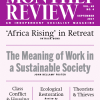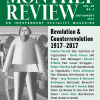
September 2017 (Volume 69, Number 4)
The publication last month of The Age of Monopoly Capital: The Selected Correspondence of Paul A. Baran and Paul M. Sweezy, 1949–1964, edited by Nicholas Baran and John Bellamy Foster, constitutes a landmark for Monthly Review Press. A historical document in itself, The Age of Monopoly Capital is not simply about the writing of their magnum opus, but also provides a window onto an entire era of American life. | more…

The Meaning of Work in a Sustainable Society
The idea of total liberation from work, in its one-sidedness and incompleteness, is ultimately incompatible with a genuinely sustainable society. The real promise of a system of labor beyond capitalism rests not so much on its expansion of leisure time, but rather on its capacity to generate a new world of creative and collective work, controlled by the associated producers. | more…

The Russians Are Coming, Again
The present Russia panic follows an entire century of fearmongering and “threat inflation,” dating to the Russian Revolution, that has long served the interests of the U.S. military-industrial complex and security state. It has had little to do with either Russian or American realities, which have been consistently distorted. | more…

‘Africa Rising’ in Retreat
The neoliberal export-oriented strategy has done enormous damage to Africa’s human development, gender equity, and natural environment. Reversing this project is the major challenge for Africans who resist injustice, through which they can build solidarity with the rest of the world’s oppressed peoples. | more…

The Struggle for Shelter
Class conflict, from both below and above, has long shaped the history of housing in Britain. These struggles continue today, as the ravages of neoliberalism have forced public housing once again onto the agenda in the United Kingdom. | more…

Theorists and Thieves
From 1972 to 1989, an obscure sect of Danish Maoists developed a unique synthesis of orthodox Marxism-Leninism, theories of imperialism and unequal exchange, and legal and illegal practice that distinguishes it from any other group then active in Europe or North America. | more…

The Need for Ecological Restoration
Scholars, scientists, politicians, and others are moved to write about climate change for a variety of reasons, including scientific advance, political influence, and public education. For the late Del Weston, the reason was clearly love—for people and for the earth. | more…

July-August 2017 (Volume 69, Number 3)
For this special issue, MR has invited some of the most profound left thinkers in the world to reflect on the legacy of revolutions and counterrevolutions around the world since 1917. Naturally, these authors do not all offer similar perspectives or come to the same conclusions. Nor should they—the historical issues are too complex and the human stakes are too high. | more…

Revolution and Counterrevolution, 1917–2017
If counterrevolution ultimately triumphed over the revolutionary waves of the twentieth century, how are we to understand this, and what does it mean for the future of world revolution? The answer requires a survey of the whole history of imperialist geopolitics over the last century. | more…

The October Revolution and the Survival of Capitalism
The October Revolution was the first such event in human history that was theoretically conceived and executed according to a plan. It is this theoretical comprehension of the underlying historical conjuncture that explains the revolution’s sweep and energy, the profound changes it wrought in the world, and the extent to which it threatened the very existence of capitalism. | more…

One Hundred Years, One Hundred Messages
The fundamental humanist values of the Russian Revolution still capture the imagination. As an experience of history and a methodology for transforming the world into a community, the revolution’s legacy has persisted far beyond the failed experiment of state socialism itself. | more…

The Great Struggle to Escape Capitalism
Post-revolutionary societies, in their efforts to combat counterrevolution, have always been confronted with their own contradictions, and with the persistent threat that an exploiting class could reemerge. Instead of the intended socialization and democratization, in many places what resulted was instead state ownership and stultifying bureaucratization of both the economy and the polity. | more…

As the World Turned Upside Down
Throughout Eastern Europe, there was an unleashing of pent-up questions, hopes, and fears brewing for decades. There was a sense that the ground was trembling underneath these experiments in socialism. It was clear to most of us that socialism could only survive through radical democratization. | more…